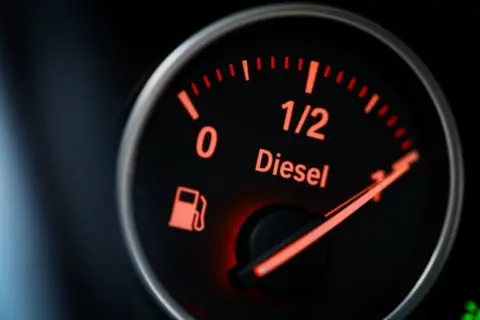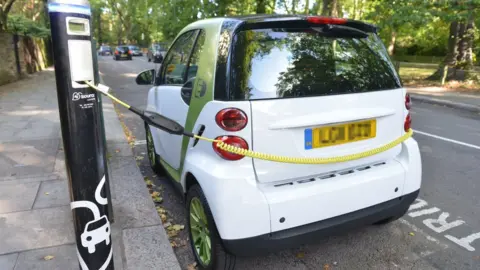Diesel cars: Your questions answered
 Getty Images
Getty ImagesDiesel car sales are set to fall this year and will account for just 15% of the UK market by 2025, down from a 50% peak, according to a new study.
Automotive expert, Professor David Bailey from Aston University said diesel's "slow death" was being driven by "environmental pressures and consumer confusion" .
We asked you to send in your questions about the diesel car industry, and put them to our Business correspondent Theo Leggett.
How has this U-turn come about - not that long ago the government was advocating diesel cars being better than petrol due to superior fuel economy?
Diesels are, generally speaking, more fuel-efficient than petrol models and they do produce less CO2 - one of the main gases associated with climate change.
As Chancellor, Gordon Brown introduced tax breaks to encourage people to buy them. However, in recent years there has been a much greater focus on urban air quality, and it has become apparent that other emissions from diesel engines, notably nitrogen oxides or NOx, are significant contributors to pollution in cities.
The Volkswagen scandal two years ago highlighted many cars, which had passed official tests in the laboratory, were producing much higher levels of NOx when used on the road. That helped trigger the political backlash we are seeing today.

What is the effect of the 'diesel scare' on resale values of cars less than three years old, particularly part-exchange values?
The backlash seems to be affecting the second-hand market as well as demand for new cars.
Data from the car sales website Motorway.co.uk, for example, suggests average values for used diesels of up to three years old have declined over the past year, while those of petrol models have risen.
Now, you might expect older diesel models to lose value in the current climate, because they are dirtier and therefore more likely to be directly affected by restrictions on entering city centres and so on. The reason more recent cars are also depreciating faster is likely to have a lot to do with a general lack of enthusiasm for diesels and the prices of new and nearly-new models coming down as dealers find them harder to shift from their forecourts.
If the prices of the newest cars are heavily discounted in the first place, then resale and part-exchange values are likely to fall as well as a matter of course.


How will the UK car-recharging service infrastructure cope - e.g. currently only two electric car charging points at Cobham services (busiest in UK)?
If you put millions of electric cars on the road today there wouldn't be enough public charging points.
However, there are two things worth bearing in mind. First, carmakers are working hard on improving the driving range of new electric models. If a range of more than 300 miles becomes the norm, many owners will rarely need to recharge their cars away from home. After all, the average car journey is less than nine miles. They will, of course, still need somewhere to charge up overnight - either at home or in the street.
Secondly, the number of charging points is increasing rapidly, even though the number of EVs on the road is still pretty small, and that trend may well accelerate as businesses see a developing opportunity.
Manufacturers are determined to sell electric models, so the incentive is there.

If diesel emissions are so bad for health and the environment, why do many new diesels have zero road tax? Does the new tax rise affect only the new diesel vehicles?
If you buy a new diesel, you will have to pay Vehicle Excise Duty on it. Only cars with zero emissions are exempt.
The system was revamped in April, and is a bit complicated, but essentially owners of all new cars - except zero-emissions models - will pay a flat annual rate of £140. On top of that, there's an extra payment based on CO2 emissions and luxury car owners pay more.
In the November budget, the government announced all diesels which didn't meet the very latest real-world emissions standards - actually due to come into force in 2020 - would face higher charges. Company car tax for diesels was also increased.
Owners of older cars are not affected. The old system of tax bands, based on CO2 emissions, will continue to apply to them.
That system was originally set up to encourage cars which emitted low levels of CO2 - including diesels - because at the time the political focus was on combating climate change, not cleaning up city air.

How do the government and the industry plan to counter the 'confusion' among consumers? In the end it is the cost that matters to most.
Good question. People within the industry are pretty angry at what they call "anti-diesel rhetoric" from the government.
They want people in authority to make it clear the newest diesels are a lot cleaner than older models, have cost advantages for drivers who drive a lot of miles because of their lower fuel consumption, and won't be affected by restrictions on entering towns and cities.
However, the government itself seems to be more focused on promoting zero-emissions vehicles - and its stated long-term goal is to phase out cars with internal combustion engines by 2040.
If diesel is to survive, the industry will need to convince ministers diesel still has an important role to play, for example in helping to meet climate change targets.
